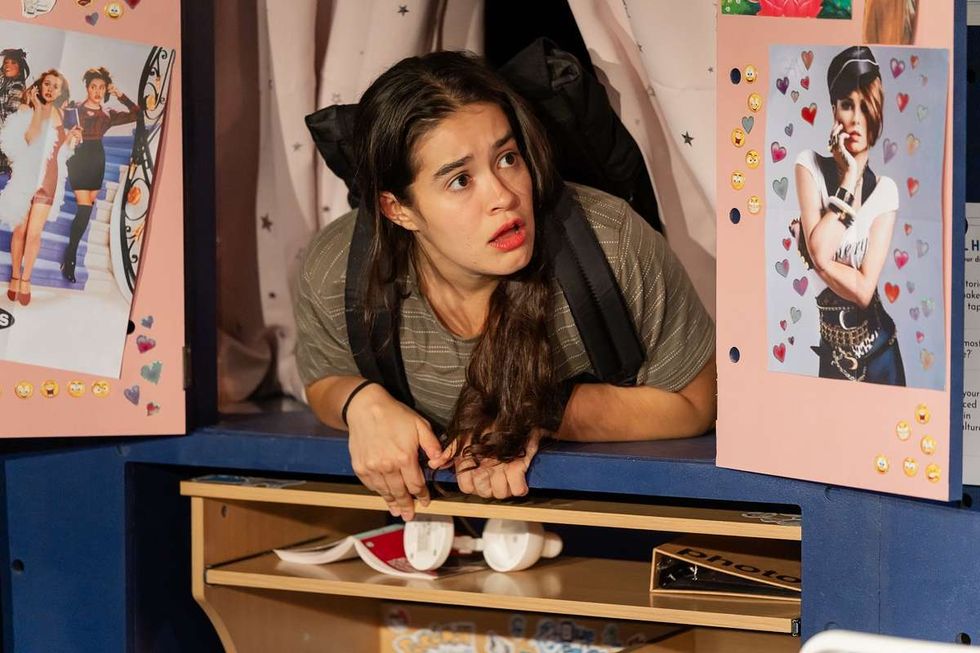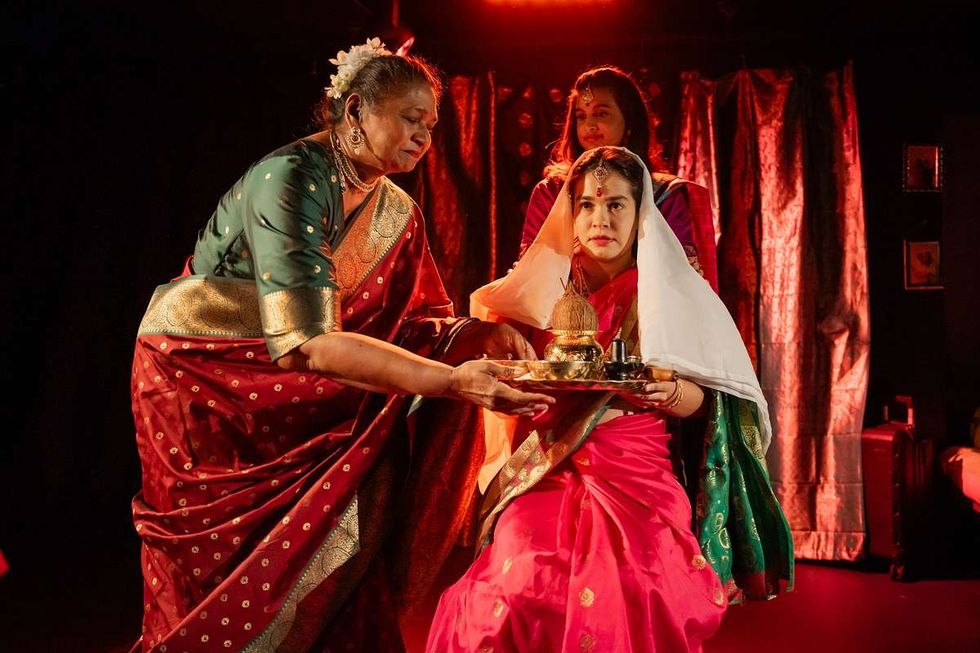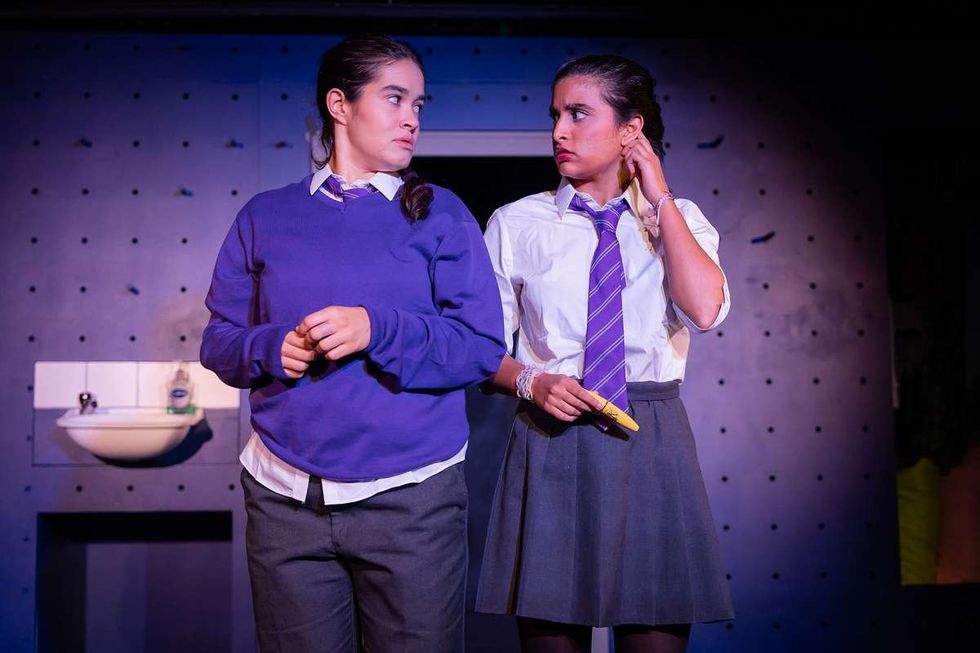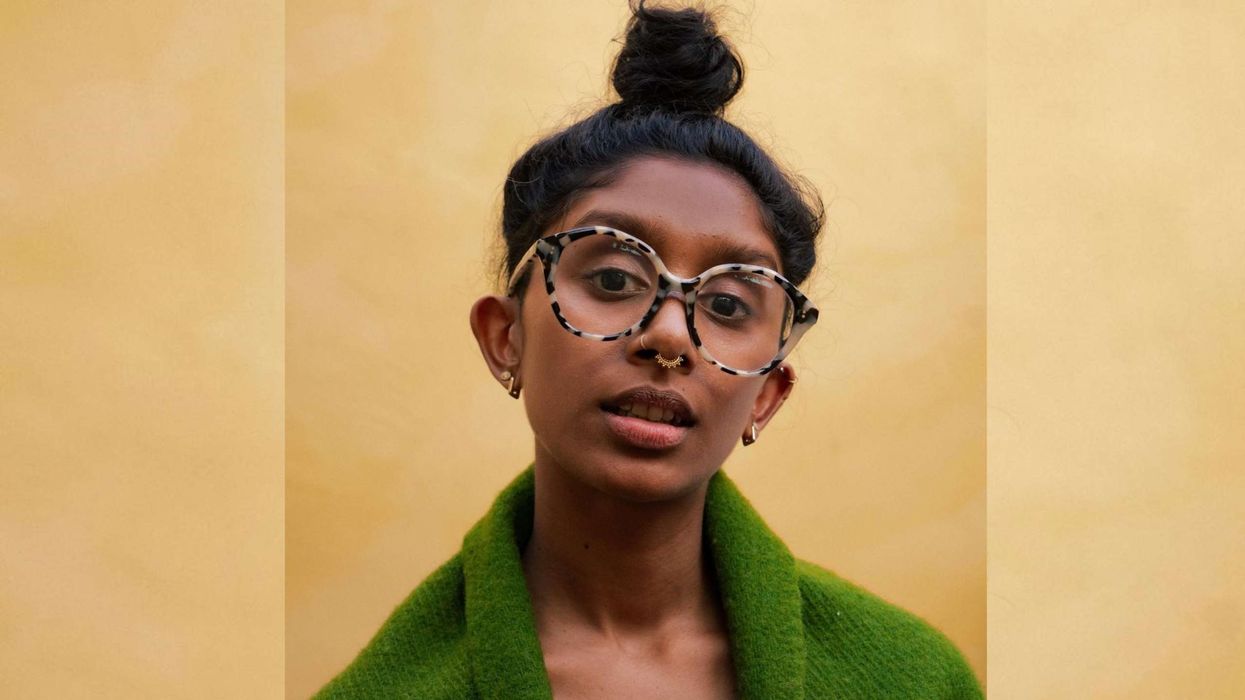There’s a new kind of coming-of-age story lighting up the London stage. Award-winning Tamil writer and performer Gayathiri Kamalakanthan is making waves with their debut play Period Parrrty, which has been earning rave reviews and playing to sold-out audiences since premiering at Soho Theatre in October. The acclaimed production continues its run there until November 22.
Set in 2010, Period Parrrty follows Krish — a Tamil teenager preparing for their period party, a traditional celebration of womanhood. But Krish isn’t a girl, and what should be a milestone quickly becomes a moment of rebellion. With help from their best friend and a growing chosen family, Krish reimagines the ritual to throw the degendered party of their dreams.
Nominated for the Tony Craze Award, the play is part queer rom-com, part celebration of Tamil resilience — exploring identity, family and self-determination in the aftermath of genocide. Presented by Kali Theatre, Period Parrrty marks a powerful debut for Kamalakanthan, whose upcoming novel-in-verse Bad Queer will be published by Faber.
Eastern Eye caught up with Kamalakanthan to talk about queering cultural traditions, finding freedom in storytelling, and why Period Parrrty is more than a play — it’s an invitation to celebrate authenticity, joy and survival.

How do you reflect on your creative journey?
My creative journey so far has been about my different creative strands – poetry, theatre, collage – to talk to each other. When I was facilitating Sex and Relationships Education, I was furloughed during the first lockdown. And in that time, I found space to write and let theatre become a new outlet. I think I’m committed to the stories I want to tell, and the form has followed.
What led to Period Parrty becoming a theatre show?
The idea for the play emerged when a colleague asked me: “what would queering a Tamil period-party look like?” What began as one scene grew into 15 minutes at a workshop, then into 40 minutes, and eventually into a full play. I realised that theatre was the right form because it lets audiences live the emotional journey of the characters — see the rituals, hear the Tamil language, and really laugh out loud with them.
Tell us about the show?
Period Parrrty follows Krish, a 15-year-old Tamil British non-binary teenager whose mother plans a traditional “samathiya-veedu” (period party) once Krish has their first period. But Krish doesn’t identify as a girl, and so the ritual feels dysphoric rather than celebratory. With their best friend Brenavee, Krish re-imagines a party that feels right for them – a party that’s about freedom and agency. The play is set in 2010, in the aftermath of the Sri Lankan civil war and Tamil genocide. And that history is what every scene is built on top of, it’s our context. Period Parrrty isn’t a historical drama, it’s actually a rom-com and our Jaffna Tamil history really pulses through it. These things don’t need to be unlinked, they’re our reality.

How important was it to get a strong cast?
A strong cast ensures that the audience is really with us at every moment. Elizabeth Green, Rani Moorthy and Tanvi Virmani – each actor really inhabits the spirit of their characters. The awkwardness, humour, grief, love – every time I watch it, I really feel it! I believe the teenage angst and longing. I believe how much mother and child want to be understood by each other.
Who are you hoping this show connects with?
I hope it connects with queer South Asian young people who seldom see their specific experience – for example non-binary and Tamil – on the stage. But I also hope it speaks to families, parents, elders, who might see this story of Krish and their mother and recognise something of their own hopes, missteps and love. And of course, anyone who wants a noughties queer rom-com!
Is there a key message you want to convey?
Cultural traditions should be living, growing things that embrace everyone’s identities and ways of being — including trans and queer people. The play asks: who gets to shape our culture, and whose voices are heard? One of my favourite lines sums it up perfectly: “Bruv, a hundred Tamils in this house — you’re not the only queer here.” That line was the seed of the show, born from the realisation that I couldn’t be the only non-binary Tamil person feeling boxed in by a gendered ritual.
Whether you’re trans or cis, those expectations of what a “woman” should be can weigh heavily.
Tell us more about that?
As Maya Angelou said, none of us are truly free until we all are. I want that sense of shared liberation to resonate in the play. And I hope young South Asian trans and queer people come away inspired to dream up their own rituals, families, and futures. It was also important to me that we recognise, within
the play, where queer-Tamil erasure began. In 1833, the British imposed their colonial laws onto Sri Lanka that criminalised transness and queerness. This legacy of hate was never ours; it was forced upon us. And of course, we have a choice about what we pass on to the next generation.
What is your own favourite moment in the show?
My favourite moment is the classic rom-com scene where Krish throws rocks at Brenavee’s window. It’s such a perfect nod to the 90s rom-coms I grew up on. There’s something tender and nostalgic about it. It’s a grand gesture, it’s goofy and vulnerable – I absolutely love it! I think it captures the heart of Period Parrrty — that mix of humour, awkwardness, yearning and hope.

How much does it mean that the run at Soho Theatre started selling out before it commenced?
It means a great deal. Strong pre-sales are a signal that there’s a hunger for stories like this. It validates the ‘risk’ of telling a specific, historically rooted, trans Tamil story. It gives the cast and company confidence and energy going into the run. And it’s a sign to commissioners that this kind of work needs to be invested in going forward.
What according to you makes for good theatre?
I think good theatre happens when the audience doesn’t just watch but experience. When they’re moved and surprised and changed by the story. I want audiences to feel like the theatre is their space, that they don’t have to be quiet. That they can whoop and cheer and cry if they need to. Across the first week of Period Parrrty, we’ve had members of the audience shout out things like: ‘She likes you!’ or ‘Just say it!’ and that’s a writer’s dream. That people are so invested in the story that they need to express what’s happening within them.
What are the future plans for this show?
The show is currently on at Soho Theatre until 22 Nov 2025. It would be great to tour the show beyond London, but no plans yet!
What inspires you?
I draw inspiration from many places: from the Tamil language and specifically how generous The Tamil Channel is with Tamil language learners. Toni Morrison wrote about “claiming the margin as central”. And I think it’s important that we write for ourselves first, what feels true and urgent in our world, rather than what might be popular in the mainstream. That line of thought has really shaped my writing.
Period Parrrty is on at Soho Theatre in central London until November 22. www.sohotheatre.com & www.kalitheatre.co.uk




